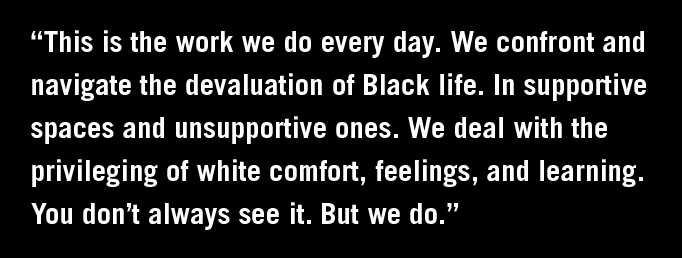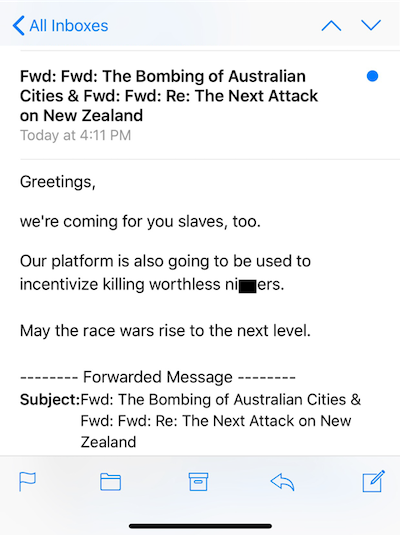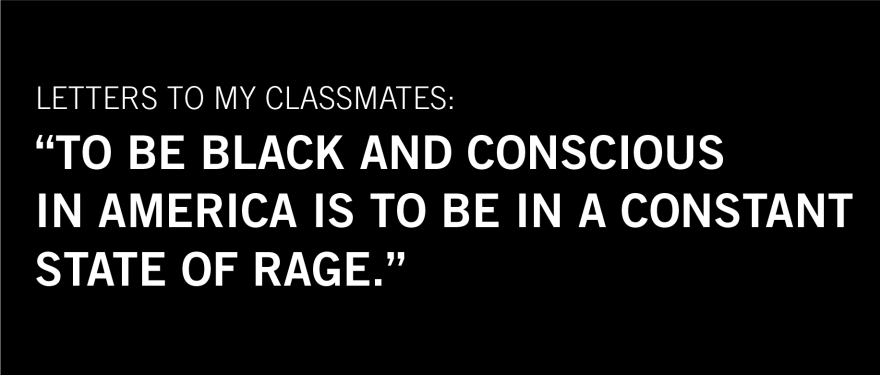Black students in our community have spent the last few weeks grappling with the weight of a devastating truth: that our country and society has undeniably and systemically failed Black communities – and the false narrative that being well educated, professionally accomplished and palatable enough for predominantly white spaces is still not enough to keep Black people safe – and there isn’t a job title or degree in the world that can protect Black communities from institutionalized and systemic racism.
Members of the HBS African American Student Union have written a series of Letters to our Classmates in an effort to elevate this message: “On behalf of your Black classmates: we’re not okay, and you shouldn’t be either”. The letters are meant to remove the onus too often placed on Black students to discuss and teach fellow classmates about the lived experiences of being Black in America. The MBA Voices blog will publish these letters, daily, with a link to the ongoing series as it unfolds.

T. Aaron Hancock, MBA ’21, Section H
To my classmates,
It has taken me numerous days and an embarrassing number of drafts to put my emotions into words. If I’m being honest, more than anything – I’m angry. I’m angry about more things than I care to list, but with the hope that this may land with some of you, I’ll try. I’d like to start this letter with an example. This e-mail was sent by “Schultz.staffel” (Schultz.staffel = SS, Hitler’s paramilitary secret police) to AASU Leadership on March 28, 2019:

1. I am angry at the truth that lingers in this seemingly outlandish Nazi-inspired hate email received by last year's AASU leadership, which reflects the ever-present shadow of white vigilantes conspiring to destroy Black lives.
2. I am angry that this country and its institutions of all types expect Black people to continue to peacefully endure messages like the above and televised murders like those in recent weeks – without any meaningful change taking place.
3. I am angry that this is at least the tenth time I’ve felt these same emotions (though, not as intensely) since January 27, 2020 – the beginning of my second semester here at HBS:
- January 28, 2020: Constructing a Nation: The United States and Their Constitution
- February 10, 2020: Donald Trump and the Tax Cuts and Jobs Act
- February 13, 2020: Viewpoints
- February 24, 2020: Andreessen Horowitz
- April 7, 2020: Ashanti Goldfields
- April 8, 2020: Kenya
- April 15, 2020: Economic Inequality
- April 22, 2020: US Mass Incarceration
- April 29, 2020: Detroit: on the Right Track?
- May 2020: Murders of Breonna Taylor, George Floyd, and Ahmaud Arbery
These are cases assigned during the second semester of HBS first-year coursework. For most, these are just cases. For us, they are frequent reminders of the systems that were built and persist to the detriment of Black people. I hate the exchange that Black students have before each of these classes: “Who’s gonna do it today?”
4. I am angry that I watched armed White Americans storm government buildings protesting minor inconveniences and now I watch as Black Americans are peppered with rubber bullets and tear gas for marching for their lives in the midst of a deadly pandemic.
5. I am angry that so many of you can show such concern for the destruction of property yet such indifference for the destruction of Black bodies.
6. I am angry that hundreds of thousands have died because we can’t afford health care, housing, or basic safety nets for Americans, but we can equip police officers with weapons meant for war.
7. I am angry that for Black students, graduation celebrations were stolen and replaced with non-stop trauma-inducing news cycles; that Black families were reminded of the challenges they face in America, when they should have been celebrating graduating from institutions their ancestors were unable to attend.
8. I am angry that the COVID-19 mortality rate for Black Americans is 2.4 times as high as the rate for Whites.
9. I am angry that I’ve somehow been tricked into believing that supporting 45 is an acceptable political stance.
10. I am angry that I had to write this letter.
I’ll conclude with a personal anecdote:
Right after Thanksgiving Break, Bryan Stevenson of the Equal Justice Initiative addressed the Class of 2021 in Klarman Hall and spoke, in vivid language, about the importance of proximity. For those of you who elected not to attend the talk, who sat on your phones the whole time, who read cases throughout, and even had the audacity to question Bryan’s authenticity out loud – I noticed.
While you may not have given a second thought to heading to Aldrich Hall for class immediately after the talk, I went to Baker Library to meditate – to try and clear my mind of the all too familiar trauma that Bryan described in the hopes that it would move some to join the fight.
The night after Bryan’s talk, I reluctantly penned an email to three HBS professors. I shared with them that while Bryan is a great speaker and his message is incredibly important, I felt it unacceptable for HBS to ask its Black students to start their day with trauma for the benefit of their peer’s (hopeful) learning.
This is the work we do every day. We confront and navigate the devaluation of Black life. In supportive spaces and in unsupportive ones. We deal with the privileging of white comfort, feelings, and learning. You don’t always see it. But we do. It’s constant and all consuming. The mental, emotional, and physical toll of it can be exhausting.
I have a confession: I have not seen Ava DuVernay’s 13th, Selma, or When They See Us. After the murder of Trayvon Martin, I promised myself I would not engage with any more media concerning the painful reality of being Black in America. Because, guess what? Watching the repeated destruction of Black bodies hurts like hell.
Thank you to everyone who reached out to check-in – it truly means a lot to me. But, I’m angry. I do not want your sympathy, I do not want your condolences, and I do not want your disbelief – I want you to embrace the pain that Black people have felt for far too long in this country – and then I want you to do something about it.

